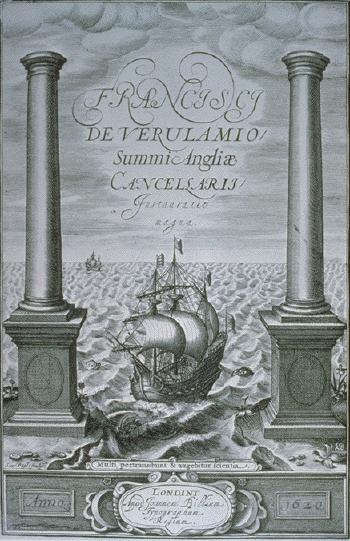
The major work of the philosopher Francis Bacon.
With the Instauratio Magna ("Great Instauration") Bacon planned to present the world with a complete division and systematic classification of all sciences, which he used as a general term for human knowledge. The work was never completed, but the parts that were published had tremendous impact on European thought.
The first part, De Dignitate et Augmentis Scientiarum, was published in 1623. It was a Latinized and expanded version of his work Of the Proficience and Advancement of Learning Divine and Profane, which had appeared already in 1605 and was the first important work on phhilosophy written in English.
The second part, Novum Organum, was published in 1620 and thus preceeded the Latin version of the first part but was developed from its English version. In Bacon's own words it contains "true directions concerning the interpretation of nature."
Its first book investigates the causes for human error and distinguishes four categories, which he calls idols of the mind: The idols of the tribe are faults of the human intellect found universally with all mankind. Idols of the cave are intellectual faults of individuals. Idols of the marketplace are the result of inaccuracies of language, and idols of the theatre are misconceptions of philosophy.
Book II of the Novum Organumdescribes the author's "new method", which is essentially inductive: Finding the truth is not achieved through the collection of supporting observations but by elimination. Thus, to verify the truth that "all A are B" it is not enough to find instances where "this A is B"; but one instance of "this A is not B" is sufficient to prove that "all A are B" is false.
Bacon's systematization of all human knowledge is contained in Book II of Advancement of Learning and in Books II - IX of De Augmentis Scientiarum. It begins with three basic divisions of intellectual endevour: memory, imagination and reason. To these are assigned the sciences of history, poetry and philosophy. Bacon ignores poetry after a cursory discussion. He divides history into natural history (the history of things) and civil history (the history of ideas). Further subdivision leads to physics and metaphysics (theoretical science) and their practical or technological counterparts, mechanics and "natural magic."
Bacon's inductive method found some application in Darwin's development of biological sciences. But in most if not all branches science is based today on the deductive principle (which derives conclusions from a hypothesis and proceeds to prove or disprove them). Bacon's ideas may thus not have stood the test of time, but he was instrumental to the development of European thought. He was the first European to devise a systematic classification of human knowledge that was not based on religion and paved the way for rational thought.

Title page of Bacon's Instauratio magna
At the time of its publication Bacon was Lord Chancellor of England, a fact stressed in the Latin title.